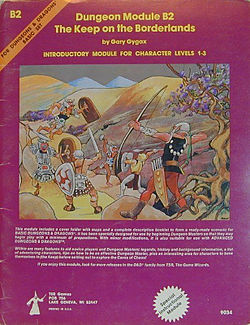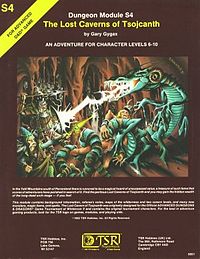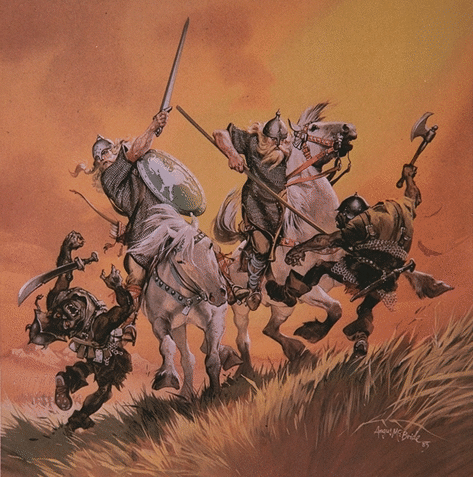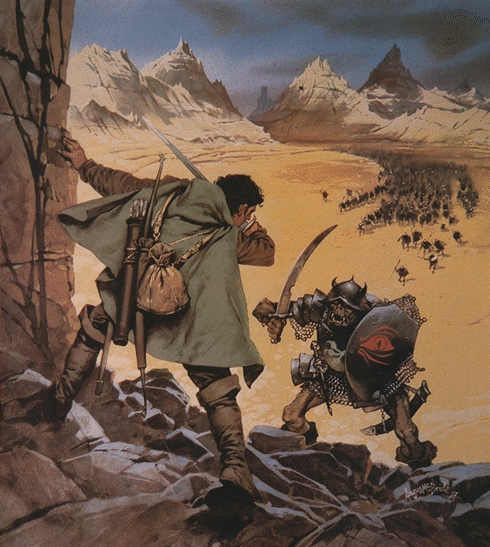This cautionary video clip, brought to you in 1993 by The 700 Club, has been making the rounds:
(More info here.)
Mocking Pat Robertson, and more specifically the anti-D&D hysteria of the 80s and early 90s, is a bit too easy at this point, so I won’t bother. But I do want to point out a few things about this video, which aims to scare people away from Dungeons and Dragons by suggesting that playing the game leads to child sacrifice and the wearing of terrible homemade wizard/KKK robes.
The most obvious thing is that nothing at all in this video remotely resembles anything that ever would be said, seen, done, or heard at a Dungeons and Dragons game. The “game” that they’re playing, which looks like a homebrew Candyland variant, bears no resemblance to D&D.
No big surprise there; few anti-D&D attacks like this showed signs that their creators had ever seen or read D&D, or talked to people who did. But look at the date this video was released: 1993, almost twenty years after D&D was first created! It’s even ten years later than Jack Chick’s infamous Dark Dungeons tract. In those two decades, nobody at The 700 Club had so much as flipped through a D&D rulebook at Toys ‘R’ Us. That graduates it well into “willful ignorance” territory.
And for somebody trying to warn of the dangers of pop culture trends, Pat Robertson has completely missed the boat here; by 1993 D&D’s heyday of popularity was well behind it. A little card game called Magic: the Gathering was just about to explode onto the scene, and as far as evil roleplaying games went, Vampire: The Masquerade and its sister games had decisively eclipsed D&D as the Shock Your Parents™ games of choice. In 1993, D&D was quaint.
Consider what this video says about Robertson’s intended audience. Anybody who had actually played D&D would immediately dismiss it as being insulting, slanderous, and irrelevent; so it clearly wasn’t bothering to address people actually playing the game. This video is talking only to people who had no clue what D&D was about, and who could be relied upon to never try to find out. Despite either laughable ignorance or simple contempt for truth, Robertson was asking people to respect his judgment about a topic they knew little about.
Ah, well. If you want to know what really goes on in the dark basements of D&D players, this remains the best source.
(Bible quote is from the Contemporary English Version.)


 Why did that strike me as funny? Because I think I’ve run Return to the Temple of Elemental Evil more than any other adventure campaign in my gaming career—at least three or four different times, for a different gaming group each time. And I loved it each time, as did my players. So hearing somebody describe it as “execrable” is just amusing; I’m sure they have a perfectly good reason for disliking it, but for such a horrifically bad product, it’s provided me with a heck of a lot of entertainment!
Why did that strike me as funny? Because I think I’ve run Return to the Temple of Elemental Evil more than any other adventure campaign in my gaming career—at least three or four different times, for a different gaming group each time. And I loved it each time, as did my players. So hearing somebody describe it as “execrable” is just amusing; I’m sure they have a perfectly good reason for disliking it, but for such a horrifically bad product, it’s provided me with a heck of a lot of entertainment!
 Many, many people have in the last few days written eloquent tributes to
Many, many people have in the last few days written eloquent tributes to  Tonight we participated in what some are calling “GaryCon”—a game of dungeon-crawling, kobold-killing, treasure-looting D&D in memory of Gary. I ran the players through a mostly improvised dungeon populated by skeletons, giant rats, and an owlbear, and remembering Gary’s DMG advice not to coddle players, I even managed to kill one of them with said owlbear. It was not the best game I’ve ever run, nor was it the worst: it was just a good game, and that seemed perfectly appropriate.
Tonight we participated in what some are calling “GaryCon”—a game of dungeon-crawling, kobold-killing, treasure-looting D&D in memory of Gary. I ran the players through a mostly improvised dungeon populated by skeletons, giant rats, and an owlbear, and remembering Gary’s DMG advice not to coddle players, I even managed to kill one of them with said owlbear. It was not the best game I’ve ever run, nor was it the worst: it was just a good game, and that seemed perfectly appropriate.
